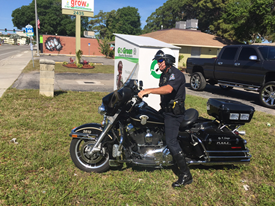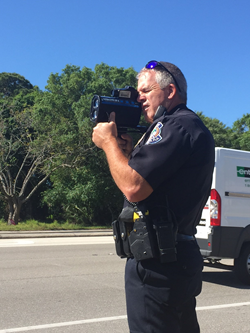Laser vs. Radar
Know the Difference
When you get a speeding ticket there is a good chance the cop either got you with their radar or by the high tech laser gun. In either situation you’re stuck dealing with a speeding ticket. Now you face the choice to fight it in court or pay the fine and deal with higher insurance rates. If you are thinking that since the officer got me with the radar there is no point in trying to fight it, you are wrong and could be throwing your money away. There are a lot of technical errors that could play in your favor when it comes to radar and laser devices.
The most common way police officers can tell if you were speeding is by using traditional radar equipment. Radar, uses what is known as the Doppler Effect or the Doppler Principle, which can be described as the change in wave frequencies received when it is either reflected from a moving object or generated on a moving object. For example, when a police officer is using radar, a radar beam directs a frequency toward your vehicle, your vehicle will then send back a different frequency which will be used to calculate the speed of your vehicle. A fast speed will equal large changes in the frequency and could result in you getting pulled over. Just because a police officer claims you were speeding doesn’t mean they are right, as there are several issues that can effect the radar readings.
In Florida, it is required that before an officer can start or finish their shift they must calibrate their radar device. In order to calibrate their device they must use a tuning fork in order to calibrate and confirm the frequency settings. If officers are experienced enough, they can visually judge how fast a vehicle is going without the use of radar. Prior to confirming the speed of a motorist an officer must make a visual observation to determine the vehicle is traveling in proximity to the posted speed limit. I witnessed an officer judge how fast several vehicles were going before using his radar, and the few times he guessed wrong he was only off by 1 or 2 miles per hour.
One of the biggest flaws with radar equipment is that an officer could be looking at your car while the radar unit is actually clocking a large truck that is further down the road. Since radar cannot tell them which vehicle it is clocking, the police officer might mistakenly think that you are responsible for the speed displayed and end up giving you the ticket instead of the truck driver. There are numerous other reasons that a radar device could give out a false reading, but mistaken identity is the most common.
 The Police Laser or LIDAR speed gun works very differently from radar. LIDAR, which stands for LIGHT DETECTION AND RANGING, works by sending out a beam of laser light that is so narrow and precise that it must be aimed with an optical sight. The laser allows a police officer to measure the speed of an individual targeted vehicle. Some laser guns even have the ability to record a video image of the vehicle and its license plate. Like the radar gun, the laser gun must also be calibrated at the beginning and end of an officer shift. Having used a laser gun in person I saw how accurate they are. The sites on these laser guns are so precise that if you do not have the sight on the vehicle, you will not get a reading. It took me several attempts before I was able to line the targeting sight with a car that was traveling 35 miles per hour.
The Police Laser or LIDAR speed gun works very differently from radar. LIDAR, which stands for LIGHT DETECTION AND RANGING, works by sending out a beam of laser light that is so narrow and precise that it must be aimed with an optical sight. The laser allows a police officer to measure the speed of an individual targeted vehicle. Some laser guns even have the ability to record a video image of the vehicle and its license plate. Like the radar gun, the laser gun must also be calibrated at the beginning and end of an officer shift. Having used a laser gun in person I saw how accurate they are. The sites on these laser guns are so precise that if you do not have the sight on the vehicle, you will not get a reading. It took me several attempts before I was able to line the targeting sight with a car that was traveling 35 miles per hour.
Unlike the mobility of the radar gun, which can be used in a stationary or moving vehicle, the laser gun can only be used from a stationary position. I also learned that the laser guns have a huge range, depending on the model, for example the two models that I were using had two different ranges, one had a range of 1000 feet while the other one had a range of 2500 feet. Knowing the type of laser the officer uses can really help your case, if they don’t list on the ticket the serial number of the device or the range, you have a good chance to get the ticket dropped.
Some of these arguments could result in the dismissal of your ticket, but for best results you should hire an attorney and let them fight your case for you. Our own attorney, David Haenel, has taken the same courses law enforcement have taken on radar and laser training and has also given lectures and taught classes at the police academy on radar and laser issues. Who better to fight for you than an attorney who has the knowledge and experience to handle your speeding tickets?
Leave a Reply
You must be logged in to post a comment.